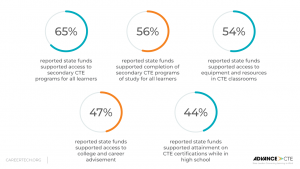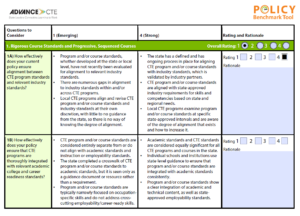Advance CTE released the 2023 State of CTE: An Analysis of State Secondary CTE Funding Models to highlight how states and the District of Columbia provide high-quality Career Technical Education (CTE) through various secondary CTE funding models and approaches. This blog, the third in a series, describes ways states have incorporated elements into their funding models to address CTE access, completion and program quality.
Overview
Advance CTE’s vision for the future of CTE calls on states to design equitable funding models that direct funding to where it is needed most. Funding is not just about budget sheets but about investing in and fostering an environment where every learner’s potential is unleashed. A state’s commitment to CTE is reflected in their financial decisions, and states are making changes to secondary CTE funding models to better serve and offer opportunities for all learners.
Background
Advance CTE conducted a survey with State CTE Directors in summer 2022 to better understand the extent to which states are currently incorporating elements into funding models to address CTE access, completion and program quality. Forty-six state leaders responded to the survey, and Advance CTE followed up with select state leaders in interviews to gather additional information about dimensions of equity.
Some of the most salient findings from the survey of State CTE Directors include:

There remains room for innovation in states’ secondary funding models as almost half of states are not supporting funding in one or several of the dimensions of equity. Additionally, almost a fifth of State CTE Directors indicated their state funding does not reflect any of the dimensions of equity. States should continue to evaluate and incorporate changes to secondary CTE funding models to ensure all learners have access and success through CTE.
Highlighted Practices
States such as Kansas, Michigan, New Mexico and Texas are linking state funding to state-approved CTE programs meeting quality standards. This move ensures access for learners regardless of their geographical location.
Other states, including Delaware, Florida, Georgia, Idaho, Indiana, Ohio, Tennessee and Texas, are incentivizing learner enrollment and success in certain CTE courses or programs aligned with state labor market needs. These states use varying weights (i.e., multipliers) based on program types or course levels, aligning educational goals with workforce demands. For example, Indiana allocates amounts based on the number of CTE credit hours generated by districts and the enrollment in apprenticeship programs or work-based learning.1
Recent shifts in foundational education formulas or bonus structures have also resulted in positive change. Massachusetts, for instance, introduced incremental funding to its formula for Chapter 70 (i.e., the major program of state aid to public elementary and secondary schools) under the Student Opportunity Act, benefitting English language learners and learners experiencing low income, including those in CTE programs.2 You can learn more about Massachusetts in the state case study accompanying this release.
In Texas, local education agencies (LEAs) can earn outcomes bonuses for learners meeting the state’s college, career or military readiness measures. This bonus is weighted for learners who are considered economically disadvantaged or who are enrolled in special populations thereby tailoring additional funds to cater to learner needs, especially within CTE programs.3 You can learn more about Texas in the state case study and read about additional examples in the Research Report accompanying this release.
Recommendations
State leaders should consider the following recommendations if they plan to leverage funding incentives and/or prioritize geographies, learner or program characteristics and/or program areas:
- Incentivize success for special populations and subgroups. Providing LEAs with bonuses for outcomes achieved by special populations and subgroups not only encourages LEAs to eliminate CTE enrollment barriers but also incentivizes districts to provide all learners with the support they need to be successful.
- Acknowledge that each learner has unique experiences, backgrounds and needs by using learner markers (e.g., special population status) to direct additional state funding where it is needed most. These special population status markers can include low income, disability and English language learner status. Embed learner characteristics or markers as a factor in formulas to ensure that the highest-need learners are getting the supports to access and succeed in high-quality CTE programs.
- Consider how to provide CTE beyond geographic borders, incentivizing schools or districts offering virtual learning opportunities or access to publicly funded CTE programs not offered in learners’ home LEA.4 This strategy could be especially helpful in areas where geography can limit program availability and career exposure.
Funding structures must continually evolve to bridge resource gaps among different learners. State CTE Directors can help shape funding conversations so learners thrive in an ever-evolving CTE landscape.
Additional Resources
Be sure to read the other blogs in this series: Funding Career Technical Education: Secondary CTE Funding Basics and Funding Career technical Education: Using the 2023 State of CTE Funding Report Resources. In the next blog in this series, we will explore how states also make contributions to CTE programs through non-categorical programmatic appropriations to support unique elements of CTE.
Please visit Advance CTE’s Learning that Works Resource Center for additional resources about CTE funding.
- State Funding Models to Support Youth Apprenticeships
- Braiding Funding to Support Equitable Career Pathways
Dr. Laura Maldonado, Senior Research Associate


 A former Business and Marketing teacher Candi Collier has been in the world of Career Technical Education (CTE) for 22 years. After serving six years at the Tennessee Department of Education, Candi went back to the field to serve as the CTE Director of Milan Special School District in Milan, Tennessee.
A former Business and Marketing teacher Candi Collier has been in the world of Career Technical Education (CTE) for 22 years. After serving six years at the Tennessee Department of Education, Candi went back to the field to serve as the CTE Director of Milan Special School District in Milan, Tennessee. 
 State leaders can use the
State leaders can use the